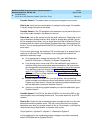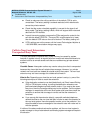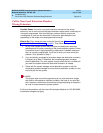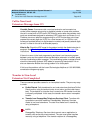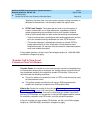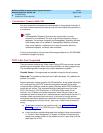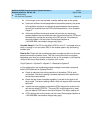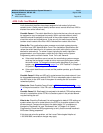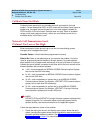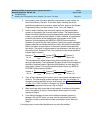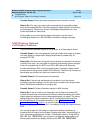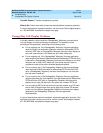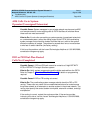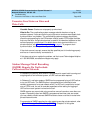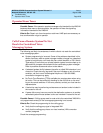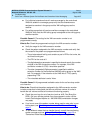
MERLIN LEGEND Communications System Release 6.1
Network Reference
555-661-150
Issue 1
August 1998
Troubleshooting
Page 6-20Callback Does Not Work
6
Callback Does Not Work 6
Callback allows queueing for an available line/trunk connected to the local
system. If a user attempts an ARS- or UDP-routed call and hears a busy signal or
warble tone, the signal may be derived from a non-local system’s tandem or
PSTN facilities. If this is the case, Callback does not work. When all available
routes on the local system are busy, a caller can use Callback to wait for an
available facility in the Route 1 pool.
Network Call Transmission Level
(Volume) Too Low or Too High 6
When transmission levels are too high or too low, the coordinating system
manager must investigate the cause.
Possible Cause 1: Switch identifiers programmed incorrectly.
What to Do: Refer to the table below as you examine the problem. It lists the
rules for programming switch identifiers. At each system in a private network,
each tandem trunk is programmed (individually or as part of a block of trunks) to
indicate the type of system connected to the other end of the trunk as well as the
distance between the connected systems.
■ 1–20 = trunk connected to a MERLIN LEGEND Communications System
that is more than 200 miles away
■ 21–40 = trunk connected to a MERLIN LEGEND Communications System
that is within 200 miles
■ 41–50 = trunk connected to a system that is not a MERLIN LEGEND
Communications System (for example, a DEFINITY ECS communications
system) and is more than 200 miles away
■ 51–60 = trunk connected to a system that is not a MERLIN LEGEND
Communications System (for example, a DEFINITY ProLogix Solutions
communications system) and is within 200 miles
NOTE:
DEFINITY ECS and DEFINITY ProLogix Solutions systems are beyond the
scope of this guide. For information about how these systems identify
tandem facilities, see the documentation for the applicable system.
Follow the steps below to check on the problem.
1. Check the routing for the call, and identify each system where the call is
routed, including the system where the call originated or was received from
the public switched telephone network. See “Reviewing the Non-Local Dial
Plan and Routing” on page 3 for instructions.



